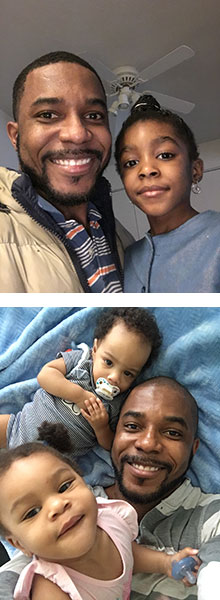Johannes Favi shared his story on May 13, 2020, with the U.S. House of Representatives Committee on the Judiciary Subcommittee on Immigration and Citizenship during its “Democratic Virtual Roundtable on ICE’s Response to COVID-19.” NIJC represents Mr. Favi in his immigration case and won his release from detention with a federal habeas lawsuit in the District Court for the Central District of Illinois.
My name is Johannes Favi. I live in Indianapolis with my wife and our children. I am grateful to have the chance to be with them, because only weeks ago I was in immigration detention in a county jail in Kankakee, Illinois. I was detained there for almost one year while my wife and I waited for the government to process the petition she filed for my green card. While I was detained, my wife gave birth to our second child and our family lost our home. I met our new baby in a picture by mail. I saw a man who was detained with me hang himself to try to commit suicide. I feel traumatized still today from all that I saw.

I am 32 years old and have lived in the United States since 2013. My wife and I have two children—a one-and-a-half year-old little girl and our son who is five months old. We are also raising my daughter from a previous relationship; she is five years old and has ongoing serious health issues that require regular hospital visits. I have a history of health problems too, including a severe case of pneumonia many years ago that left me with ongoing respiratory problems.
In June 2019, immigration officers arrested me at the courthouse in Indiana when I appeared in connection with an old case from 2015. That case is the only time I have ever been arrested and I paid a heavy price when I accepted a plea bargain and spent months in jail. However, because of that old conviction I was in immigration detention for nearly a year with no bond hearing and without the possibility to see the sun or breathe fresh air. I spent night after night thinking about it, and I read about the law in the library, and I came to understand why I was disqualified from bond. It is wrong. It made me feel the system was rigged against me from the start just like in a casino.
Detention sounds and feels more like prison
I saw many things in immigration detention I never thought I would see. Most of the people detained have no chance, and you see that every Friday when they deport 15 or more people at a time out of a cell block of forty-eight. Many people are deported so fast that between transfers they are unable to communicate with their families abroad or even see a judge before they leave.
The rest of us who try to fight our cases felt that we were desperately waiting for our turn to be slaughtered. Some waited for a year or two years or three years, surviving on anti-depressant pills. To us, detention sounds and feels more like prison. The number of people detained in my block who went from healthy to sick and had to take pills to sleep or for other health issues increased every day. I believe more than 60% of my block was on pills during the holiday season.
A week before my wife had our son I broke down and sent a medical request for help. I was so stressed and anxious that I was unable to sleep for three days. To survive it seemed we had only two options:
first, read the bible and pray for God’s mercy, or second, take a pill not to go crazy. Guards often called out to inmates to make a line for medication using jokes they thought were funny like, ‘’Medicina para locos,” which in Spanish means, “medicine for the crazy.”
When I first got to the jail, I remember, there was a man there who had been detained for 15 months and was trying to fight his case. One day he just broke down, and he grabbed a paper and wrote “I would like to be deported ASAP,” and the next week Immigration and Customs Enforcement (ICE) put him on a flight. Just like that.
Being in that jail for so long, it felt like torture. ICE has the power to free you, but they don’t want to. It’s on purpose—keeping you in jail gets to your mind, to your soul, so you want to give up on your freedom and even on your life.
When the coronavirus came, it was a disaster
We first started hearing about the COVID-19 virus from the news. The officers would say to me often when I asked to watch the news, “you again with that story,” like it was a joke or fake news. But to me it was not a joke because my life was in danger and my children were outside, depending on me. It is very stressful to be detained during this pandemic because you cannot take care of your own health and safety.
At the beginning of the outbreak, the facility did not give us any instructions on how to prevent the spread of the virus. No one told us to wash our hands or avoid touching our faces. They did not distribute gloves, masks, or hand sanitizer. The guards did not maintain social distance; they would come close to us and speak to us. It is impossible to practice social distancing in detention. I was housed in an open dorm in a block that held 48 people. The dorm was split into 12 cubicles with dividers, and each cubicle had four people sharing one toilet and one sink. We had to line up closely together to receive meals and then sit closely together at a table just like at a restaurant or food court.
I was always worried for my family. Before I was detained I used to work two or three jobs at a time to make sure we could afford to live in a safe neighborhood. I was their provider, but then ICE took me away. We lost our house and my wife had to leave almost everything we had and move when she was pregnant. My wife had to try to care for the children herself while working all her shifts at the post office. I worried so much for my daughter who has special needs – who would be able to take her to the hospital? Who would be there for them?

The government had scheduled my wife and me for our visa interview on March 23rd, but then on March 20th, U.S. Citizenship and Immigration Services canceled it because of the virus. It seemed like my detention would have no end and I would never have a chance to be reunited with my family. If it wasn’t for my legal team at NIJC and the decision of a federal court judge, I wouldn’t have the chance to be with my family today.
I still live in fear that one day ICE will arrest me again and handcuff me in front of my children. I look at our life now and I know we have to start all over again. We could have avoided this. It could have been done differently. Did ICE really think I would run away, when I am a father to three children and they have my passport?
Detention is not the solution for a civil matter like immigration, especially during this pandemic. It is wrong to put people in handcuffs and in legcuffs as if they were in a maximum security prison. Detention camps should not be a solution to fix decades of mishandling from a broken immigration system. Handcuffing people in front of their wives and children is wrong and should stop. I think every day about the people who are still in detention who should not be there. They lost their jobs, their lives, they were separated from their children. I never thought the United States justice system could be this wrong.
Today I am given the opportunity to be their voice. Today all the immigrants that are living in those detention centers or prisons without a known date of release are counting on members of Congress to reunite the hard workers, the providers, the fathers, the mothers and all the children to their families.
Watch Johannes share his testimony during the House Judiciary roundtable in May 2020:
Johannes Favi is a husband and father of three who lives in Indianapolis.
